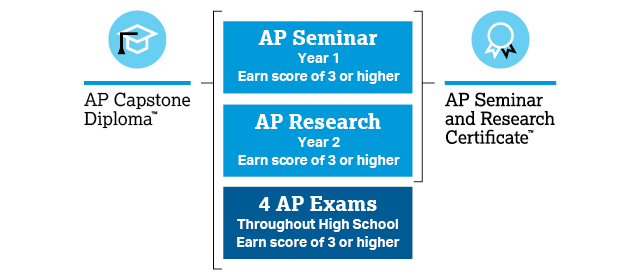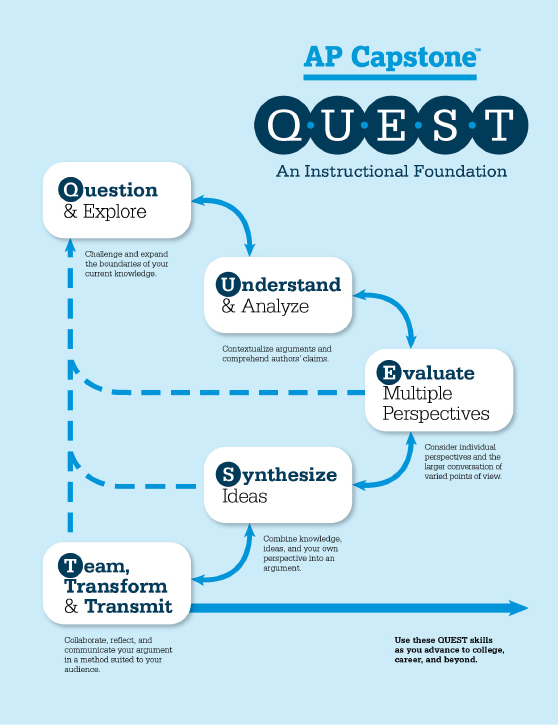How AP Capstone Works
AP Capstone™ is a diploma program based on two yearlong AP courses: AP Seminar and AP Research. These courses are designed to complement other AP courses that the AP Capstone student may take.
Instead of teaching specific subject knowledge, AP Seminar and AP Research use an interdisciplinary approach to develop the critical thinking, research, collaboration, time management, and presentation skills students need for college-level work.
College Board developed the AP Capstone Diploma program at the request of higher education professionals, who saw a need for a systematic way for high school students to begin mastering these skills before college.
Higher education professionals: Learn about developing AP Capstone credit and placement policies.
Program Details
Students typically take AP Seminar in grade 10 or 11, followed by AP Research. Each course is yearlong, and AP Seminar is a prerequisite for AP Research.
In both courses, students investigate a variety of topics in multiple disciplines. Students may choose to explore topics related to other AP courses they’re taking.
Both courses guide students through completing a research project, writing an academic paper, and making a presentation on their project.
Over the course of the two-year program, students are required to:
- Analyze topics through multiple lenses to construct meaning or gain understanding.
- Plan and conduct a study or investigation.
- Propose solutions to real-world problems.
- Plan and produce communication in various forms.
- Collaborate to solve a problem.
- Integrate, synthesize, and make cross-curricular connections.
Visit the AP Seminar and AP Research course pages to learn more.
Send your students to the AP Seminar and AP Research pages on our AP Students site to explore the courses.
Assessment
AP scores for both courses are based on teacher assessment of student presentation components and College Board scoring of student-written components plus an end-of-course exam (for AP Seminar only).
Visit the AP Seminar Exam page and the AP Research Exam page to learn more about the assessment of student work in AP Capstone courses.
Awards
Students who earn scores of 3 or higher in AP Seminar and AP Research and on four additional AP Exams of their choosing receive the AP Capstone Diploma™. Students who earn scores of 3 or higher in AP Seminar and AP Research but not on four additional AP Exams receive the AP Seminar and Research Certificate™.
Students who earn these awards can view and print their diploma or certificate online. The award is also acknowledged on any AP score report that is sent to colleges after the award has been conferred.
Note: the AP Capstone Diploma and AP Seminar and Research Certificate are reported to colleges and universities as AP Scholar Awards and appear in Scholar Roster reports.
Summary Data
To see how many AP Capstone awards were granted in the latest AP Exam administration, visit our Research site.
Pedagogy
AP Capstone gives students the following pedagogical foundation, called the QUEST framework, to develop, practice, and hone their critical and creative thinking skills as they make connections between various issues and their own lives:
- Question and Explore
Questioning begins with an initial exploration of complex topics or issues. Perspectives and questions emerge that spark one’s curiosity, leading to an investigation that challenges and expands the boundaries of one's current knowledge. - Understand and Analyze Arguments
Understanding various perspectives requires contextualizing arguments and evaluating the authors’ claims and lines of reasoning. - Evaluate Multiple Perspectives
Evaluating an issue involves considering and evaluating multiple perspectives, both individually and in comparison to one another. - Synthesize Ideas
Synthesizing others’ ideas with one’s own may lead to new understandings and is the foundation of a well-reasoned argument that conveys one’s perspective. - Team, Transform, and Transmit
Teaming allows one to combine personal strengths and talents with those of others to reach a common goal. Transformation and growth occur upon thoughtful reflection. Transmitting requires the adaptation of one’s message based on audience and context.
Professional Learning
Because of the unique format of the AP Capstone courses, all AP Seminar and AP Research teachers must take part in training prior to their first year teaching the course.

